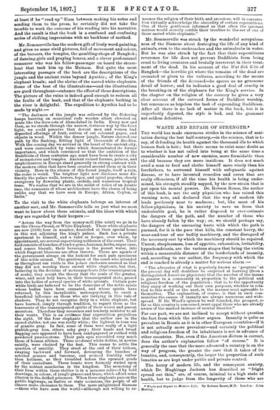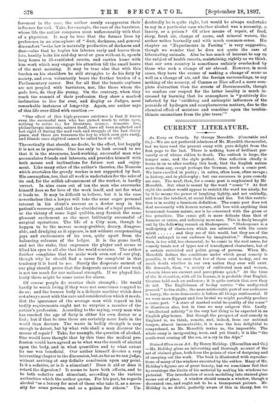WASTE AND REPAIR OF STRENGTH.*
THE world has made enormous strides in the science of sani- tation during the last half-century,—in the science, that is to
say, of defending its health against the thousand ills to which human flesh is heir ; but there seems to exist some doubt as to whether it has not called into being at the same time a considerable number of new enemies, more formidable than the old because they are more insidious. It does not much avail a man to feed and clothe himself more wisely than his forefathers, to surround himself with safeguards against disease, or to have invented remedies and cures that are really efficacious, if all the time his health is being under- mined, his strength steadily sapped, by the new strain that is put upon his mental powers. Dr. Robson Roose, the author of this book, is not the only physician who has raised this warning note, and declared that the way of modern life leads perilously near to madness ; but, like most of his fellow-physicians, in his anxiety to save us from that undesirable goal, he is rather disposed to over-estimate the dangers of the path, and the number of those who have already fallen by the way ; or, we should perhaps say, the dangers of the unceasing haste with which the path is pursued, for it is the pace that kills, the constant hurry, the wear-and-tear of our bodily machinery, and the disregard of
the necessary rest by which the machinery should be repaired. Unrest, sleeplessness, loss of appetite, exhaustion, irritability, hypochondriasis, are the various stages that bring the victim within a measurable distance of the borderlands of insanity, and, according to our author, the frequency with which the end is reached is already a matter for serious alarm :— "The advocates of what is popularly known as ' progress ' at the present day will doubtless be surprised at learning (from a distinguished American physician) that the number of the insane is greater in a community in proportion to the political and religious freedom of the population ; that is, to the opportunity they enjoy of working out their own purposes, whether in rela- tion to this world or the next, in the manner most agreeable to themselves. The explanation, of course, is that in suoh com- munities the causes of insanity are always numerous and wide- spread. If Dr. Wood's opinion be well founded, the prospect, so far as this country is concerned, must appal those who are already aware of the marked increase of mental disorder."
For our part, we are not inclined to accept without question the fact from which the author argues. Insanity is quite as prevalent in Russia as it is in other European countries—if it is not actually more prevalent—and certainly the political and religious freedom of its inhabitants is not in advance of other countries. Nor, even if the American dictum is correct,
does the author's explanation follow "of course." It is generally the ease that the more advanced a country is on the
way of progress, the greater the care that it takes of its lunatics, and, consequently, the larger the proportion of such lunatics as are kept under public and private control.
The hurry of modern life, and the consequent anxiety, which Dr. Hughlings Jackson has described as "fright spread out thin," are, of coarse, inimical to a high state of health, but to judge from the longevity of those who are
• Waste and :Repair in Modern Life, By Robson Roos% M.D. London: John Murray.
foremost in the race, the author surely exaggerates their influence for evil. Take, for example, the case of the barrister, whose life the author compares most unfavourably with that of a physician. It may be true that the former lives by preference in an atmosphere of "dust, darkness, and general discomfort "—the law is naturally productive of darkness and dust—also that he begins his labours early and leaves them late, hastily bolts his mid-day meal or goes without it, spends long hours in ill-ventilated courts, and carries home with him work which may engage his attention till the small hours of the next morning. It may be true also that with this burden on his shoulders he still struggles to do his duty by society, and even voluntarily bears the further burden of a Parliamentary career. But for all that the lunatic asylums are not peopled with barristers, nor, like those whom the gods love, do they die young. On the contrary, when they reach the summit of their profession they show a marked inclination to live for ever, and display as Judges, most remarkable instances of longevity. Again, our author says of this life over-filled with exertion :— "One effect of this high-pressure existence is that it leaves even the successful man who has gained much to retire upon, nothing to retire to ; for literature, science, domestic ties, philanthropic interests, nature itself, have all been neglected and lost sight of during the mad rush and struggle of the last thirty years, and these are treasures the key to which soon gets rusty, and friends once slighted cannot be called back at will."
Theoretically that should, no doubt, be the effect, but happily it is not so in practice. One has only to look around to see that it is the strenuous, hard-working, successful man who accumulates friends and interests, and provides himself with both means and inclinations for future rest and enjoy- ment. Like many other of the author's theories, the Nemesis which overtakes the greedy worker is not supported by fact. His assumption, too, that all work is undertaken for the sake of its end, for the selfish advancement of the worker, is hardly correct. In nine cases out of ten the man who overworks himself does so for love of the work itself, and not for what it leads to. It may be difficult to believe, but it is the case nevertheless that a lawyer will take the same eager personal interest in his client's success as a doctor may in his patient's recovery, and that the elucidation of a legal problem, or the victory of some legal quibble, may furnish the same pleasant excitement as the most brilliantly successful of surgical operations. The life of a City man, though he happen to be the merest money-grubber, dreary, disagree- able, and drudging as it appears, is not without compensating joys and excitements of its own, quite apart from the balancing columns of the ledger. It is the game itself, and not the stake, that engrosses the player and seems to blind his eyes to all else that the world contains. The author further complains that we make work even out of our play, though why he should find a cause for complaint in that tendency it is hard to see. Surely the desperate earnest of our play should prove that the desperate earnest of our work is not too much for our national strength. If we played list- lessly there might be some cause for alarm.
Of course people do overtax their strength ; life would hardly be worth living if they were not sometimes tempted to do so; and the human body is a delicate machine which does not always meet with the care and consideration which it needs.
But the ignorance of the average man with regard to his bodily requirements ought not to surprise a member of the author's profession. According to the saying, every man who has reached the age of forty is either his own doctor or a fool ; but if that be true there are certainly more fools in the world than doctors. The waste in bodily strength is easy enough to detect, but by what rule shall a man discover the means of repair ? Take, for example, the question of alcohol.
One would have thought that by this time the medical pro- fession would have agreed as to what was the result of alcohol upon the body, and in what quantities and to what extent its use was beneficial. Our author himself devotes a very interesting chapter to the discussion, but, as far as we can judge, without arriving at any definite conclusion upon any point.
Is it a sedative, or is it a stimulant? Does it aid or does it retard the digestion ? It seems to have both effects, and to be both sedative and stimulant, according to the various authorities which the author quotes. For his part, he regards alcohol "as a luxury for most of those who take it, as a neces- sity for some persons, and as a poison for others." Un- doubtedly be is quite right, but would he always undertake to say in a particular case whether alcohol was a necessity, a luxury, or a poison ? Of other means of repair, of food, sleep, fresh air, change of scene, and mineral waters, the author writes learnedly and with much common-sense. His chapter on ",Experiments in Pasting" is very suggestive, though we wonder that he does not quote the case of hibernating animals. Also he has much of interest to say on the subject of health resorts, maintaining, rightly as we think, that our own country is sometimes unfairly overlooked by those who seek a change of air abroad. However, in most cases, they have the excuse of seeking a change of scene as well as a change of air, and the foreign surroundings, to say nothing of the scenery, of Cannes or Nice afford a more com- plete distraction than the streets of Bournemouth, though we confess our respect for the latter locality is much in- creased by learning that its atmosphere is "positively dis- infected by the oxidising and antiseptic influences of the peroxide of hydrogen and camphomceous matters, due to the chemical effect of moisture and sunshine upon the terebin- thinate emanations from the pine trees."



































 Previous page
Previous page